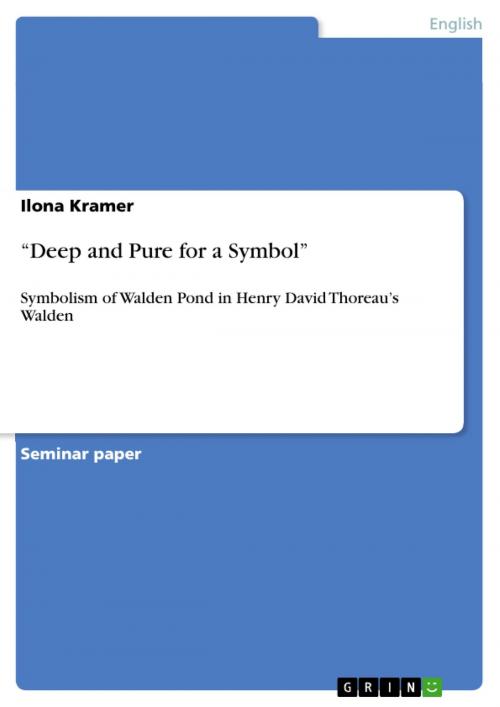'Deep and Pure for a Symbol'
Symbolism of Walden Pond in Henry David Thoreau's Walden
Fiction & Literature, Literary Theory & Criticism, British| Author: | Ilona Kramer | ISBN: | 9783640547814 |
| Publisher: | GRIN Publishing | Publication: | March 3, 2010 |
| Imprint: | GRIN Publishing | Language: | English |
| Author: | Ilona Kramer |
| ISBN: | 9783640547814 |
| Publisher: | GRIN Publishing |
| Publication: | March 3, 2010 |
| Imprint: | GRIN Publishing |
| Language: | English |
Seminar paper from the year 2007 in the subject English Language and Literature Studies - Literature, grade: 1,00, University of Heidelberg, course: Henry David Thoreau, language: English, abstract: I. Introduction In the chapter 'Where I lived and What I lived for', Thoreau explains what he wanted to achieve by his experiment: I went to the woods because I wished to live deliberately, to front only the essential facts of life, and see if I could learn what it had to teach, and not, when I came to die, discover that I had not lived. I did not wish to live what was not life, living is so dear; not did I wish to practise resignation, unless it was quite necessary. I wanted to live deep and such out all the marrow of life [...] to drive life into a corner, and reduce it to its lowest terms, and, if it proved to be mean, why then to get the whole and genuine meanness of it, and publish its meanness to the world; or if it were sublime, to know it by experience, and be able to give a true account of it [...]. For most men, it appears to me, are in a strange uncertainty about it, whether it is of the devil or of God [...]. (W, 72) This passage demonstrates Thoreau's desire to establish a relationship to the world around him. Feeling that, like most people, he lived 'what was not life', he moves to Walden Pond in order to find out for himself what life actually was. He feels that nature can reveal truths and meanings to him and thus help him to overcome the 'strange uncertainty' about the character of the world and of his own life. But if nature seemed to 'communicate' with man, how could he make sure to understand its message? ... In order to 'translate' his experience to his readers, Thoreau uses natural imagery in a highly symbolic way. ... In the book we find the pond described in a very detailed way: its size, the depth, the flora and fauna. The meanings of these descriptions are various and at the end this small body of water comes to symbolize almost everything of Thoreau's spiritual, philosophical and personal message. In order to demonstrate this, it is necessary to look closely at what Thoreau has to say about the pond and his relationship to it. Because water, the element of the pond, is a powerful symbol in itself, I will begin by a short introduction of a universal symbolism of water and examine how this symbolism is applied in Walden. I will then proceed to a more specific analysis of the pond imaginary, which is particularly concentrated in the chapters 'The Ponds' and 'The Pond in Winter' and 'Spring'. [...]
Seminar paper from the year 2007 in the subject English Language and Literature Studies - Literature, grade: 1,00, University of Heidelberg, course: Henry David Thoreau, language: English, abstract: I. Introduction In the chapter 'Where I lived and What I lived for', Thoreau explains what he wanted to achieve by his experiment: I went to the woods because I wished to live deliberately, to front only the essential facts of life, and see if I could learn what it had to teach, and not, when I came to die, discover that I had not lived. I did not wish to live what was not life, living is so dear; not did I wish to practise resignation, unless it was quite necessary. I wanted to live deep and such out all the marrow of life [...] to drive life into a corner, and reduce it to its lowest terms, and, if it proved to be mean, why then to get the whole and genuine meanness of it, and publish its meanness to the world; or if it were sublime, to know it by experience, and be able to give a true account of it [...]. For most men, it appears to me, are in a strange uncertainty about it, whether it is of the devil or of God [...]. (W, 72) This passage demonstrates Thoreau's desire to establish a relationship to the world around him. Feeling that, like most people, he lived 'what was not life', he moves to Walden Pond in order to find out for himself what life actually was. He feels that nature can reveal truths and meanings to him and thus help him to overcome the 'strange uncertainty' about the character of the world and of his own life. But if nature seemed to 'communicate' with man, how could he make sure to understand its message? ... In order to 'translate' his experience to his readers, Thoreau uses natural imagery in a highly symbolic way. ... In the book we find the pond described in a very detailed way: its size, the depth, the flora and fauna. The meanings of these descriptions are various and at the end this small body of water comes to symbolize almost everything of Thoreau's spiritual, philosophical and personal message. In order to demonstrate this, it is necessary to look closely at what Thoreau has to say about the pond and his relationship to it. Because water, the element of the pond, is a powerful symbol in itself, I will begin by a short introduction of a universal symbolism of water and examine how this symbolism is applied in Walden. I will then proceed to a more specific analysis of the pond imaginary, which is particularly concentrated in the chapters 'The Ponds' and 'The Pond in Winter' and 'Spring'. [...]















